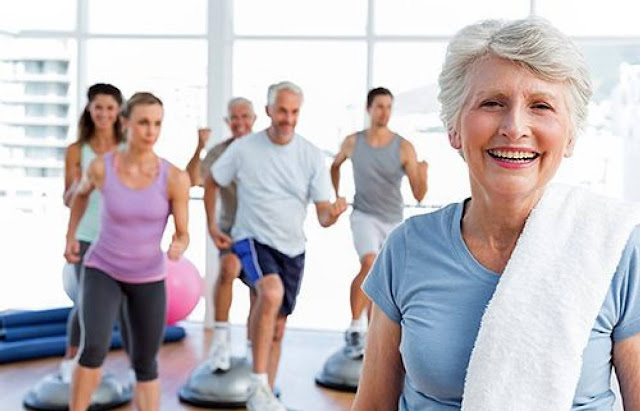Exercise Recommendations for Healthy Aging
To experience the full benefits of exercise for healthy aging, it's crucial to follow recommended guidelines for physical activity. The American College of Sports Medicine (ACSM) and other health organizations provide guidance on exercise for older adults:
Aerobic Exercise: Aim for at least 150 notes of
moderate-intensity aerobic exercise or 75 minutes of vigorous-intensity aerobic
exercise per week. This can be broken down into sessions as short as 10 minutes
at a time. Aerobic activities should include brisk walking, jogging, cycling,
swimming, or other activities that elevate your heart rate and make you breathe
harder.
Strength Training: Include strength training exercises at
least two days a week. Strength training, which can involve weightlifting,
resistance band workouts, or bodyweight exercises, helps build and maintain
muscle strength.
Balance and Flexibility: Incorporate activities that enhance
balance and flexibility, such as yoga, tai chi, or specific balance exercises.
These are particularly important for maintaining mobility and reducing the risk
of falls.
Practical Tips for Staying Active as You Age
Start Slowly: If you're new to exercise or haven't remained
active for a while, start slowly and gradually increase the intensity and period
of your workouts. Consult with a healthcare breadwinner to ensure you choose
the right exercises and progress safely.
Choose Enjoyable Activities: Select exercises that you
enjoy, as it will increase your motivation to stay active. Whether it's
dancing, gardening, playing a sport, or walking in nature, find activities that
bring you joy.
Set Realistic Goals: Establish attainable fitness goals that
align with your current fitness level and gradually increase the challenge.
This approach is additional sustainable and reduces the risk of injury.
Stay Consistent: Consistency is key to experiencing the
benefits of exercise. Create a regular exercise routine by scheduling workouts
at consistent times throughout the week.
Adapt and Modify: As you age, your exercise needs may
change. Be open to modifying your exercise routine to accommodate any physical
limitations or changes in health status.
Stay Hydrated: Proper hydration is essential, especially as
you healthy age. Drink enough water before, during, and after your workouts to stay
properly hydrated.
Listen to Your Body: Pay attention to how your body responds
to exercise. If you experience pain or discomfort, it's essential to address it
and, if necessary, modify your exercise routine.
Seek Social Support: Consider exercising with friends,
joining group classes, or participating in community-based fitness programs.
Social support can boost motivation and make exercise.
Conclusion
Exercise is a powerful tool for promoting healthy aging. By
maintaining muscle mass, bone density, cognitive function, cardiovascular
health, and mobility, exercise can help you enjoy a fulfilling and active later
life. It's never too late to start reaping the benefits of physical activity,
and even small efforts can lead to significant developments in your overall
well-being.
Whether you're looking to start a new exercise routine or
adapt your current one, the key is to stay active and embrace the positive
changes that exercise can bring to your life as you age. It's not just about
the quantity of years but the quality of life that truly matters.




Comments
Post a Comment